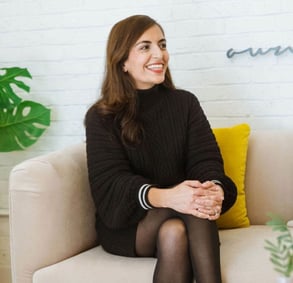DatingAdvice.com | Haley Matthews
June 25, 2020
The Short Version: Women may visit a variety of doctors and facilities for wellness checkups, fertility planning, and services like in-vitro fertilization (IVF). But a group of OBGYNs from Kindbody set out to change that healthcare structure by offering all of those services under one roof, and the clinic’s OBGYNs serve a variety of women, from those considering long-term family planning to women seeking post-menopausal advice.
Many women experience a disconnect between different types of healthcare services. They may visit one doctor for a pap smear, another for egg freezing and fertility planning, and yet another for an intrauterine device (IUD) for birth control. Those women may also find themselves searching for a new physician at many different stages of their lives.
That was the problem one group of OBGYNs, fertility specialists, reproductive endocrinologists (REIs) set out to solve. They saw that women were bouncing from doctor to doctor, so they created Kindbody, a comprehensive healthcare provider that offers a spectrum of services at one clinic.

Kindbody offers a variety of women’s healthcare services under one roof.
Women who seek care at Kindbody can have all their healthcare needs met by the same doctor at the same location. For instance, they can start with a fertility assessment and move onto egg freezing. Later, when they’re ready to get pregnant, the Kindbody team can complete their intrauterine insemination (IUI).
Dr. Fahimeh Sasan, Kindbody’s Founding OBGYN, said that she wanted the clinic to offer a holistic option and improve on the patient experience in general. To accomplish that, Kindbody simplifies the process of providing care while teaching women about their health and fertility options.
The founding team also included CEO Gina Bartasi, a businesswoman with extensive experience in the fertility industry.
“Even educated women know very little about their bodies and reproductive health. We want women to be better educated in that area,” Fahimeh said.
Kindbody operates clinics in New York, San Francisco, Los Angeles, and Princeton, New Jersey. It is also working to open a new clinic in Palo Alto, California. The team has a robust online presence for virtual appointments and a network of partner clinics around the country.
Creating an Ideal Experience for Clients
When women visit Kindbody’s website, they are greeted by a straightforward interface for booking services, assessment, and coaching. Additionally, if patients are unable to travel to a physical office, they can use the clinic’s telehealth options to interact virtually.
“We use technology to make appointments or participate in virtual appointments. All of our online tools have an intuitive aspect that makes them easy to understand,” Fahimeh told us.
When clients come into a Kindbody clinic, they often remark how the space looks more like a spa than a doctor’s office. The clinics are designed to promote a calming, welcoming atmosphere that clients — many of whom may be nervous — appreciate.
To enhance their approachability, clinic doctors don’t even wear lab coats. All of the OBGYNs are women, too, because clients typically prefer consulting with other women regarding their fertility and reproductive health.
“All of our clinicians are women, and we do that intentionally. There’s a lot of shame around women’s health, so we want to give those women a voice. The more we talk about women’s health, the less scary it becomes,” Fahimeh said.
Though the Kindbody experience feels elite, the team is committed to making it accessible to every woman. Services typically cost 30% less than they do at other offices, and the clinic offers flexible pricing, as well.
“Fertility services are often out of pocket, so we want to bring down the cost so it’s not just available to the top 1% of women who can afford it,” Fahimeh said.
Educating Patients About Fertility Problems
“There’s a huge lack of preventative care when it comes to fertility. Often, women are told that they should try for a year and see what happens before seeking help. We want to educate women about their fertility before they start this journey,” Fahimeh said.

Dr. Fahimeh Sasan, Kindbody Founding OBGYN, said there’s a lack of fertility preventative care.
About 10% of women struggle to get pregnant or stay pregnant. After a woman is 35, it becomes more difficult for her to get pregnant without help. By age 45, it is nearly impossible for a woman to become pregnant naturally.
What’s more, as a woman ages, her eggs are more likely to have abnormal chromosomes. That could result in miscarriage or a child with developmental delays.
Men also face more difficulties getting women pregnant as they age. If a woman is with a man who is over 40, she is less likely to become pregnant than if her partner were younger.
Kindbody administers an anti-mullerian hormone test, or AMH, for women interested in tracking their fertility. This test provides women with more information about their ovarian function and estimates how many eggs they have left. However, it is only one way of determining fertility, and Kindbody clinics use multiple measures to offer women the most accurate estimates.
Kindbody also offers its services directly to employers as a fertility benefit for their employees in an effort to make its services even more affordable and accessible.
Kindbody: Caring for Women in All Stages of Life
Many women feel like they need to keep quiet about many aspects of their reproductive health, from menopause to coping with the shame of miscarriages. Fahimeh said the latter is a topic that she’s seen women often struggle to deal with.
“About 40% of pregnancies end in miscarriages in the first trimester. The vast majority of women have miscarriages, but they don’t think they know anyone else who has. These are things we don’t talk about, but we do a disservice to women by not sharing our stories,” she said.
She hopes that the stigma around discussing miscarriages is shifting. Former First Lady Michelle Obama shared her struggles with miscarriages and the fertility treatments she underwent to have her daughters. More women should feel open to telling their stories about fertility, and Kindbody hopes that their clinic is one place where those women can start.
It’s that kind of openness and honesty that has drawn women to Kindbody. Some are interested in pap smears, while others seek out birth control methods. Kindbody helps women interested in having children, as well, including those in same-sex relationships and single women who want to have kids on their own.
“We do a range of gynecological care, so we see the entire spectrum of women,” said Fahimeh.
Since Kindbody first opened its doors in New York City in 2018, it has already seen considerable growth. Now, it plans to expand to more cities and is developing partnerships with healthcare plans to expand fertility benefits.
But at its core, Kindbody advocates for women.
“We came together as a group of women to provide the care we would want to receive ourselves. How kind is everyone to you? How quickly are your questions answered? How responsive is the team to your needs?” Fahimeh said.
More Press
Kindbody’s Dr. Fahimeh Sasan on The Hendy Show
In this episode, Amanda welcomes Dr. Fahimeh Sasan, Founding Physician & Chief Innovation Officer at Kindbody. You’ll learn the ins and outs of fertility treatment, from the emotional to practical.
Dr. Erica Louden on Chicago Tonight
Dr. Erica Louden (Kindbody Chicago) weighs in on the controversial IVF ruling in Alabama.